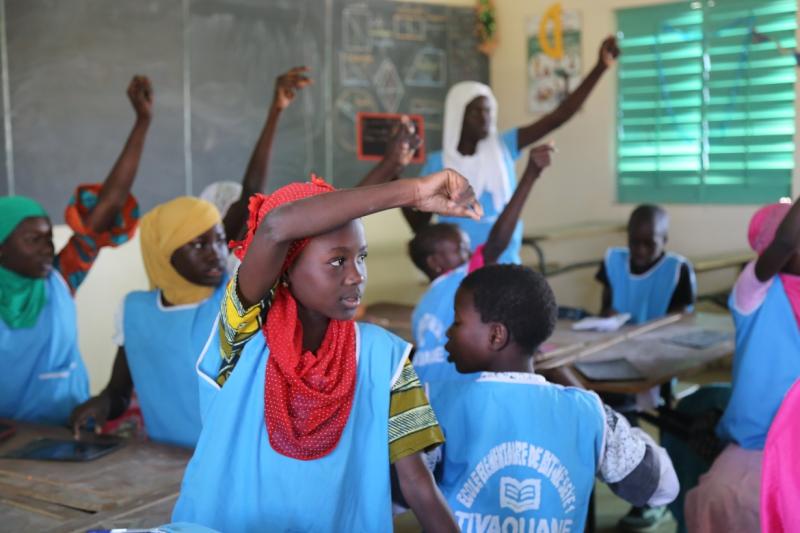
To help transform education systems in the West and Central Africa and Indian Ocean regions, the KIX Africa 21 regional hub advocates a step-by-step, highly consultative policy dialogue. This process aims to promote the consideration and integration of knowledge and innovations in the formulation of education policies and the development of sector education plans.
Policy dialogue begins with ministries of education taking ownership of the Knowledge and Innovation Sharing (KIX) program under the Global Partnership for Education (GPE), through national KIX coordination teams and all stakeholders in the sector.
This is based on the premise that education policies, governance, and systems management are more effective when the innovations and knowledge most likely to bring about systemic change are identified, analyzed, validated, and integrated, using a consensus-based approach, into a national policy dialogue involving all stakeholders.
Sharing experiences, best practices, and evidence can effectively guide public education policies.
These spaces for dialogue enable intra- and intersectoral consultations, which help define the role of the different entities involved in the selection of priority reforms and the long-term vision of the education system.
The education ministries that implemented this dialogue process, in collaboration with the KIX Africa 21 regional hub, gave nongovernmental organizations the opportunity to gain visibility within the wider KIX regional network, as well as institutional recognition for the relevance of their actions.
Beyond these elements, the synergy between the KIX Africa 21 regional hub and Education Out Loud, two GPE initiatives, naturally manifested itself during these policy dialogues, whose starting point is a call for proposals for innovations, practices, and knowledge likely to transform education systems at national and regional levels.
National civil society thus seized this opportunity to share the innovative initiatives of its members in order to make them better known or even to adapt them in other countries, and ultimately to enable them to be scaled up at national level.
Woubibox: A digital education solution
Burkina Faso needs an alternative to enable children to stay connected with education against a backdrop of school closures owing to the security crisis facing the country since 2016. The aim is to bring education as close as possible to the children when they need it, taking into account the local context.
The Coalition Nationale pour l’Education Pour Tous du Burkina Faso (CN-EPT/BF) (National Coalition for Education for All in Burkina Faso) has therefore designed a project that responds to several key issues raised by stakeholders in the world of education, namely the education of girls and vulnerable pupils among internally displaced populations, distance education in times of security or health crises, and, more generally, education in emergency situations.
The Woubibox is a mobile, autonomous, and integrated digital education solution designed to ensure the continuity of education in areas of high insecurity or isolation in Burkina Faso.
The "education box"
The Woubibox functions as a minicomputer that provides access to educational content (audio, video, text) without Internet, via its own wireless network. It can be used simultaneously by individuals or groups (up to 200 users) and includes a projection kit. The project features its own autonomous solar-powered electricity production system.
Woubibox is formed from the word "Woubi" in the Mooré language (one of Burkina Faso's national languages), meaning "to educate", and the English word "box".
Visibility of innovation leads to scaling up
The Woubibox was developed by CN-EPT/BF, in partnership with the Akoma Group, as part of the Sahel Youth Project financed by Agence Française de Développement (AFD).
With the aim of promoting innovation and attracting the interest of partners for its large-scale deployment, Woubibox took part in a competition organized by KIX’s Africa 21 hub, where it was awarded an innovation prize.
This distinction has enhanced Woubibox's credibility and visibility with a number of partners, notably the Burkina Faso Ministry of Education and companies through their social responsibility policy, with whom discussions are underway to finance and deploy this innovation for the benefit of a significant number of pupils and their teachers.
The local observatory of education quality in Senegal
The Coalition des Organisations en Synergie pour la Défense de l’Éducation Publique (COSYDEP) (Coalition of Synergistic Organizations for the Defense of Public Education), in partnership with Aide et Action International (AEAI), set up an education observatory in the Diourbel region of central Senegal in 2012.
The observatory is a mechanism for monitoring, alerting, and making proposals. These are frameworks for dialogue between local school stakeholders who rigorously collect data, draw up alternative reports, and build holistic, local solutions in response to the specific challenges of each region, which are then shared with local decision-makers.
As part of the GPE-funded Education Out Loud program, the experience has already been assessed and gained was scaled up and implemented in all 14 regions of Senegal in 2019 and through local COSYDEP branches.
The observatory also won first prize in KIX's Africa 21 Knowledge and Innovation competition.
Framework for participatory reflection
Dialogue within the observatory strengthens constructive collaboration among local school stakeholders and fosters an inclusive, participatory approach that is crucial not only to ownership, but also to finding solutions to the problems identified.
The observatory operates by holding meetings on a range of topics, including the stability and performance of the education system, violence in schools, resilience, and inclusion in alternative education and training programs.
Raising awareness among and listening to stakeholders are key to successful mobilization and commitment.
Establishing a climate of trust within the education community
The observatory has also helped set up school management committees and has trained committee members in school administrative and financial management.
For their part, school authorities are more open to a culture of transparency and accountability. This approach has helped build trust among stakeholders and prevent conflicts that could arise from a lack of transparency in the management of schools' financial and material resources and has therefore contributed to a climate of trust within the education community.
